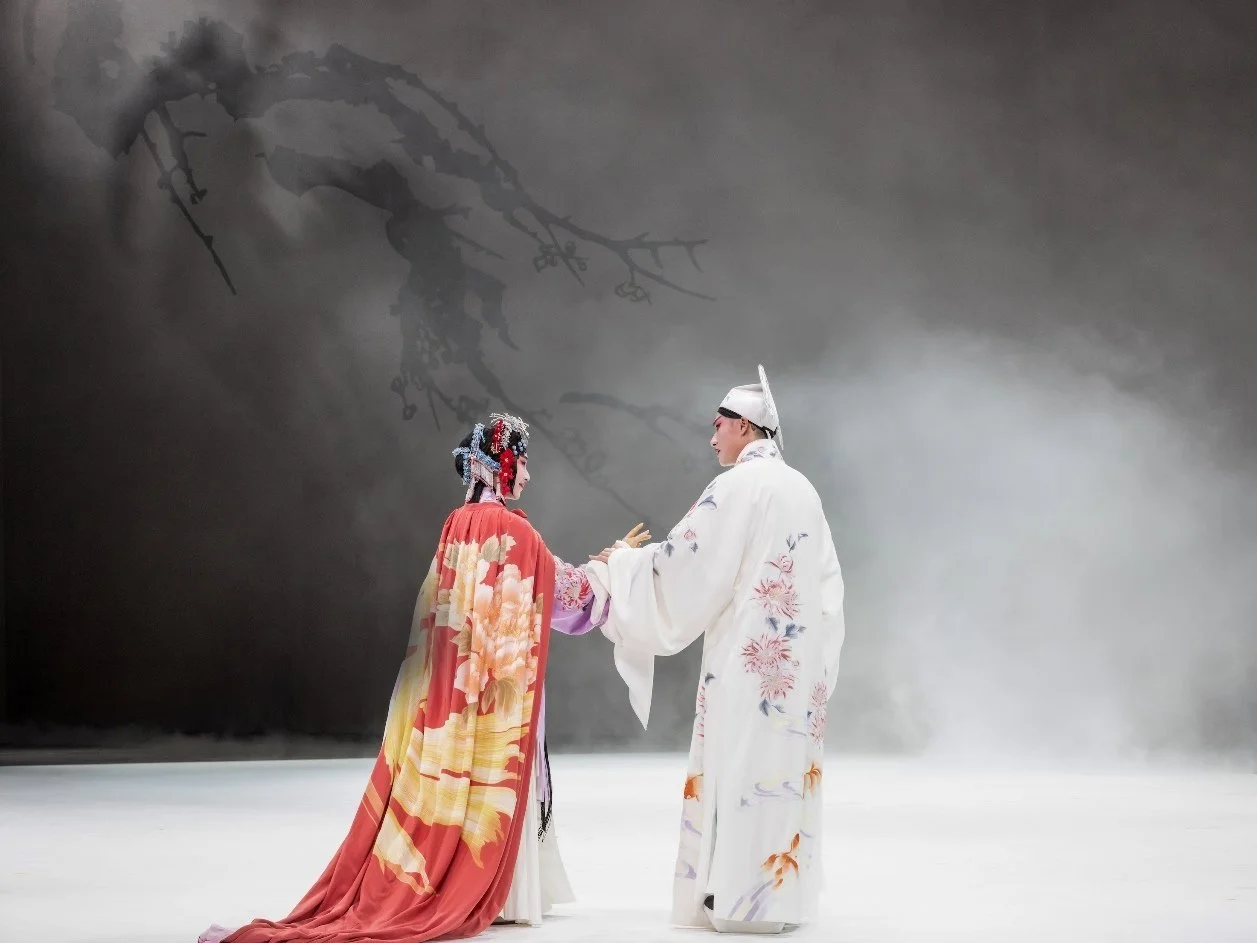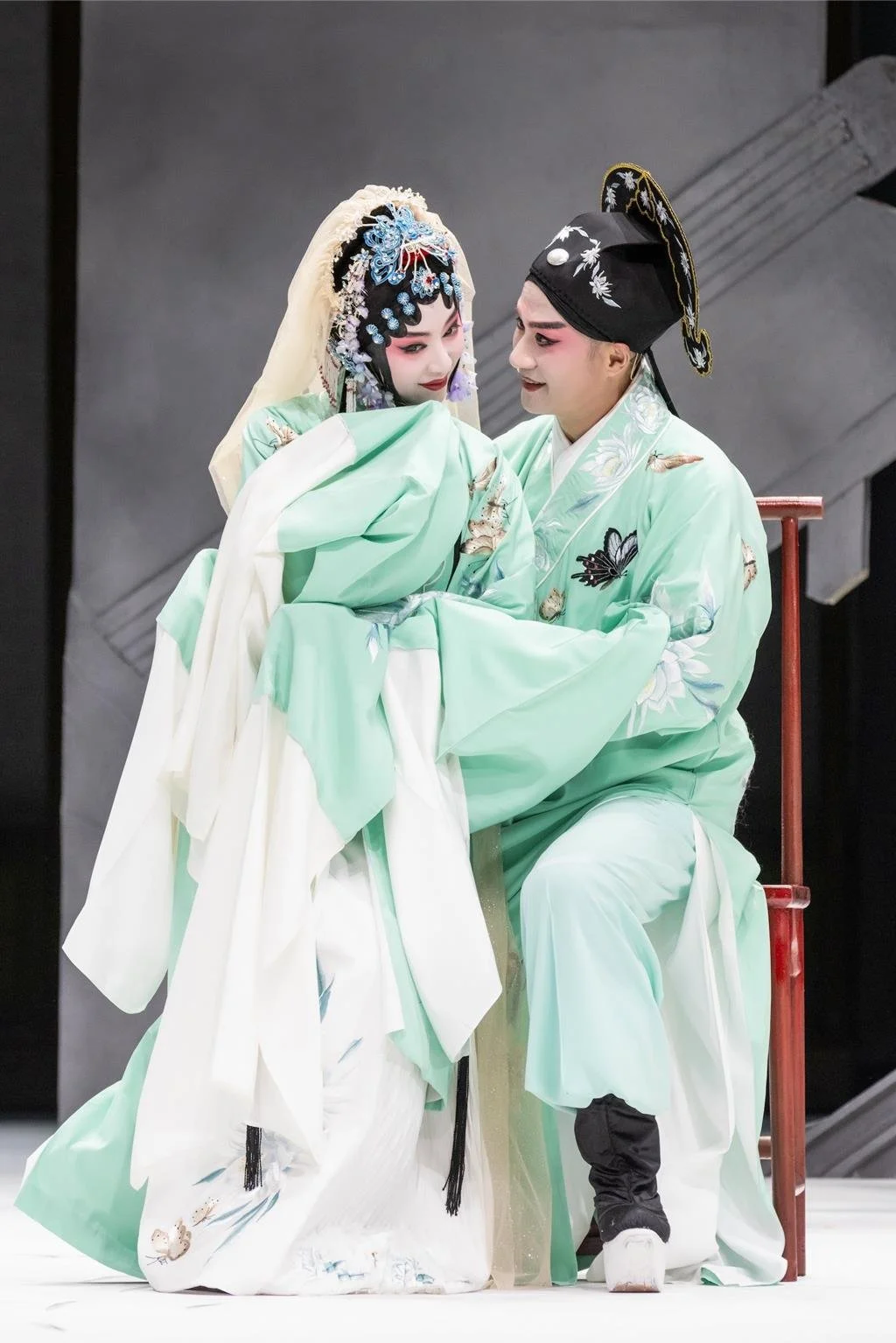Reimagining Kunqu Classic: Return to the Peony Pavilion
With Return to the Peony Pavilion, Shanghai Grand Theatre recreates celebrated Kunqu opera classic, shedding light on this eternal tale of love that transcends time and space, life and death.
Sense of Wander: ★★★★☆
Towards the end of the play, Du Liniang (left) and Liu Mengmei (right) find a happy ending as they come together in unity and joy. Image courtesy of Chien Kuo Foundation For Arts And Culture.
TAIPEI, Taiwan — Often considered as the Chinese counterpart to Romeo and Juliet, The Peony Pavilion (牡丹亭) is a classic Kunqu opera written by Tang Xianzu (1550—1616), a distinguished Chinese playwright from the Ming dynasty (1368—1644). This era witnessed a flourishing of literary forms, notably the birth of dramatic genres like chaunqi; Tang’s masterpiece stands as the pinnacle of this creative genre, epitomising the artistic brilliance of Ming literature.
The story of The Peony Pavilion revolves around Du Liniang, a young maiden who, after a vivid dream of love, succumbs to an intense longing that leads to her untimely death. Her spirit roams the earthly realm and, in a union of the living and the ghostly, she finds love with the scholar Liu Mengmei (Liu, meaning “willow,” and Mengmei, meaning “dream of plum”). Tang Xianzu’s story ends with the two lovers’ journey transcending boundaries between life and death, marking a tale of reincarnation and reunion.
Tang’s masterful work weaves together poetic brilliance and musical brilliance, offering a timeless exploration of themes such as love, dreams, and the mystical realm. This turns the The Peony Pavilion into an entry point for both newcomers and seasoned enthusiasts of Kunqu opera to immerse themselves in this traditional art form.
Boasting 55 scenes, the staging of the complete play spans three days. As a result, the performance often takes the form of carefully curated excerpts. Among them, the scenes of “Stroll in the Garden” (You Yuan), where Du Liniang explores a beautiful garden in her dream, and “The Dream Encounter” (Jing Meng), marking the inception of Du Liniang and Liu Mengmei’s love story, stand out.
The play stands as a timeless classic, and the mere thought of reinterpreting it is no less daunting than proposing a fresh perspective on Shakespeare’s masterpieces. Despite this challenge, the Shanghai Grand Theatre, in collaboration with playwright Luo Zhou, fearlessly embarked on staging Return to the Peony Pavilion (重逢牡丹亭). This production, debuted in Shanghai in 2022, not only brings a novel lens to appreciate this Kunqu classic but also highlights the brilliance of the Ming-dynasty playwright.
In her creative process, Luo Zhou made a remarkable observation in Tang Xianzu’s work, particularly in how the narrative’s timeline has been artfully cut and reassembled, forming a closed loop of time and space. Without Du Liniang’s dream of Liu Mengmei, there would be no destined encounter, and consequently, no experience of the profound emotional wounds that eventually lead her to death. But without death, Du’s spirit wouldn’t have entered Liu’s dream — there would be no reciprocal entry of Liu into Du’s dream, and thus, their fateful dream encounter would never have taken place!
In a dream, the two lovers share a poignant moment expressing their deep affection for each other. A closer examination of their costumes reveals meticulous embroidery featuring butterflies and flowers, set against an otherworldly lake-green backdrop. Image courtesy of Chien Kuo Foundation For Arts And Culture.
And the way to break free that loop? Tang Xianzu may have already provided the answer:
Emotions arise without our knowledge, (情不知所起)
deepen with each step, (一往而深)
for the living can experience death, (生者可以死)
and the dead can come back to life. (死可以生)
If there is no possibility for the living to be united with the dead, (生而不可與死)
and for the dead to be reborn, (死而不可復生)
then it is not the utmost depth of emotions. (皆非情之至也)
Evidently, Return to The Peony Pavilion is more than just a revisit to this Kunqu classic — it is a return to the very essence of love, an underlying message intricately embedded by the Ming-dynasty playwright centuries ago. This reinterpretation also highlights Liu Mengmei’s emotional depth, or qing — an aspect often overlooked in the traditional repertoire of the play, but crucial to the story’s development.
Liu Mengmei’s enduring affection, a love that appears almost eternal, becomes the pivotal force in deciding the life and death of Du Liniang. If he were to doubt Du’s testimony and hesitate in the daring quest to unearth her grave to bring her “back to life”, thus avoiding the impending danger of execution, Du’s spirit would forever linger near the plum blossom tree (where she was buried), caught up within the realms of dreams. But fueled by Liu’s unwavering faith, the maiden’s resurrection brings a happily-ever-after finale to this tale.
Beyond the realms of fate and mystical forces, the very essence of this tale is woven from the threads of faith and affection. Yet, in the intricate tapestry of emotions, these pillars find their strength in the bedrock of love, anchoring the narrative with destiny and passion.
As I immerse myself in Return to The Peony Pavilion, it strikes me that this timeless play is but a reflection of the myriad love stories unfolding with each passing moment. The Peony Pavilion isn’t just a tale of love due solely to the affection between Du Liniang and Liu Mengmei; rather, its endurance lies in the fact that everyone lives in their own version of The Peony Pavilion — though these versions may not dazzle with theatrical flair and delve into the weighty questions of life and death central to this Kunqu classic.
In Return to the Peony Pavilion, the ingenious stage set designs craft an illusion of space, blurring the lines between reality and dream. Image courtesy of Chien Kuo Foundation For Arts And Culture.
Tips for wanderer — If you’d like to delve deeper into The Peony Pavilion or simply watch how it’s staged as a Kunqu play, check out the following:
2024 Hong Kong Arts Festival
If you find yourself in Hong Kong during March 2-4, 2024, don’t miss the rare occasion to indulge yourself in the complete 55 scenes of The Peony Pavilion. Over three days, the Shanghai Kunqu Opera Troupe will immerse you in the rich legacy of Chinese opera. This performance is a highlight of the 2024 Hong Kong Arts Festival.2024 Taiwan International Festival of Arts
Celebrating its 20th anniversary, the youth edition of The Peony Pavilion, produced by renowned writer Bai Xianyong (also known as Pai Hsien-yung) and the Suzhou Kunqu Opera Theatre, will grace the stage at Taipei’s National Theatre from March 29 to 31, 2024. (Please note that all tickets have been sold out at the time of writing.)
Shanghai Grand Theatre’s Return To The Peony Pavilion was staged at the National Theatre in Taipei from November 24 to 26, 2023.




